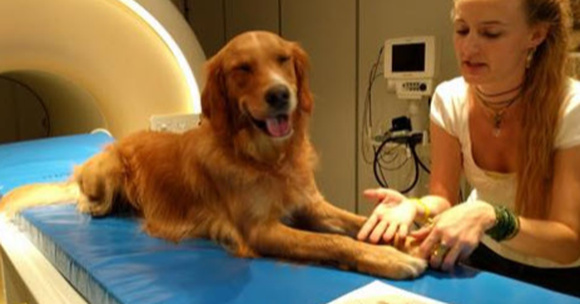There has been an ongoing debate about the ability of dogs to understand human speech for quite some time. Some people feel that dogs really only understand the emotion that you put into speech and not the words themselves. There are also some of us who believe that dogs have the ability to understand more than what most people give them credit for.
If you are somebody that feels your dog understands you when you talk, you might not be far from the truth. Studies have shown that dogs understand humans a lot better than what most people give them credit for. This research, done at the Eötvös Loránd University in Budapest, Hungary was published in Science.

Researchers used 13 family dogs who lived with humans and were trained to sit inside of an MRI scanner. That type of scanner can measure brain activity while the dog is awake. The dogs were mostly made up of a group of Golden retrievers and Border collies and they were never restrained while inside the scanner. If they felt uncomfortable, they could leave.
They used a recorded voice from the trainer saying certain phrases with various types of expression.
One of the terms that was used by the dog owners is a form of praising their animal. The used it with the type of inflection in the voice that would typically be used when praising the dog. There were also a number of neutral words used, such as conjunctions, as they did not carry any real meaning. Those other words were spoken in a neutral tone.
Changes were then made to the way that the expressions were said. They would begin using a neutral tone in their voice to say the praise words and they would use the neutral words in a way that sounded like they were praising the dogs.

While they were speaking to the dog, they were recording the dogs’ brainwave patterns. What they found was quite interesting.
They found that dogs were able to process the tone of voice and the word separately in a different part of the brain. The left hemisphere of the brain would light up when they used familiar praise words. This was similar to the location where humans process language.
The tone of the voice, however, seemed to light up the right hemisphere of the brain. This is also similar to the way the human brain works.
It is important to understand that the tone was still significant to the dog, even though it was processed differently.

The reward center in the brain was stimulated when they heard the praise words spoken in a positive way. They responded to the praise words regardless of how they were spoken, but it was only registered as a positive when a praise to was used.
“It shows that for dogs, a nice praise can very well work as a reward, but it works best if both words and intonation match,” Andics, the lead researcher, said in a statement. “So dogs not only tell apart what we say and how we say it, but they can also combine the two, for a correct interpretation of what those words really meant. Again, this is very similar to what human brains do.”
Although this does not necessarily prove that dogs understand exactly what we are saying at all times, it does indicate that they have an ability to discern the difference between words that they have heard and they haven’t heard.
Dog owners have used verbal commands for quite some time as a way of training their animals. This has clearly shown that dogs were able to identify familiar words.
“The main result is not that they can differentiate words, but that they differentiate meaningful and meaningless words, and the left hemisphere has a key role there.”
Via: Huffington Post
Be sure to share this with your friends on Facebook

